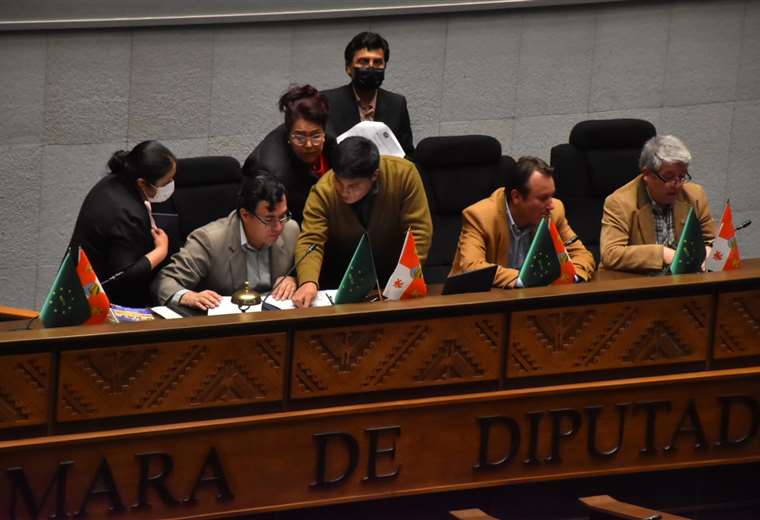November 25, 2022, 23:30 PM
November 25, 2022, 23:30 PM
After just over seven hours of session and five of arguments from different deputies, finally at 1:45 this Saturday the Census Law, in large, was submitted to a secret vote or scrutiny. A total of 119 deputies, who were in the room (11 were on medical leave), cast their vote. An hour later the counting of the votes began.
The scrutiny, announced at 3:00, resulted in: 93 upvotes23 against, two (2) targets and one (1) void.
The approval is expected in detail, after the figure of “sufficient discussion of debate” was approved.
The ‘evistas’ were the first to take the floor to make it known that they were opposed to the bill. They exposed that supposedly there is an alliance between Creemos, Comunidad Ciudadana and the ‘renovators’ of the MAS, whom the deputy Ramiro Venegas described as “traitors and sell-outs”.
After long speeches, each demonizing or praising the strike in Santa Cruz, according to each front, the law was approved, by which the eastern capital is headed for the 36th day of indefinite strike, since even the Inter-institutional Committee for the Promotion of the Census has not yet defined whether it will be lifted or notbecause the treatment of the law in Senators is still missing.
For several parliamentarians, the law in question was unnecessary because the objective of the new norm is already contemplated in the Political Constitution of the State (CPE).
In its Sole Article the law establishes:
“YO. Based on official data from the Population and Housing Census, issued by the National Institute of Statistics (INE), the Executive Branch will carry out the new distribution of tax co-participation resources from the month of September of the management 2024″.
II. The National Institute of Statistics (INE) will forward to the Supreme Electoral Tribunal the official data of the Population and Housing Census, according to the date of the preceding paragraph, so that the bill for the distribution of seats is drawn upin accordance with Article 146 paragraphs V, VI and VII of the Political Constitution of the State and the current Electoral Legislation, that would be applied in the next General Elections in the State Plurinational of Bolivia”.
deputies officialistas they took advantage of the use of the word to request prison for the governor of Santa Cruz, Luis Fernando Camachowhom they blame for economic losses, going through violence, even deaths, during the civic strike that began on October 22 and is still going on.
Some parliamentarians also included in those accusations Rómulo Calvo, president of the Committee for Santa Cruz, and Vicente Cuéllar, rector of the UAGRM and head of the Inter-institutional Committee.
At least three deputies openly They recognized that they did not want to pass the law because they knew that this would result in fewer parliamentary seats and fewer resources for their regions. However, they recognized that these places have reduced their population, due to the lack of employment or opportunities for economic development.
The parliamentarians from Santa Cruz María René Álvarez, Verónica Aguilera and Luisa Náyar valued the efforts of the people who comply with the strike in the department and denounced police abuses towards citizens in these 35 days. Náyar asked that the project be modified, to include that the new distribution of economic resources be carried out from September 2024and that the results of the 2024 census be applied in the 2025 national elections.
Aguilera also recounted the times in which the Government affirmed and guaranteed that the census would be carried out on November 16, 2022, then continued exposing the subsequent changes, which gave the new date, first June 2024, and finally June 23. March 2024.
The countryside vs. city discourse was widely used by the MAS deputies in their addresses, as was the antagonism between rich and poor; “studied” with academic titles and “not studied”.
The pacification of the country and the economic reactivation were the most frequent arguments of those who said they were in favor of the approval of the law.


















